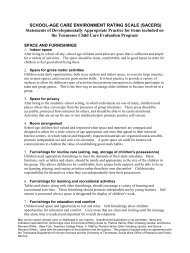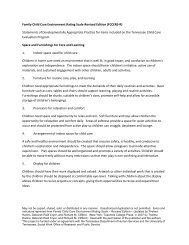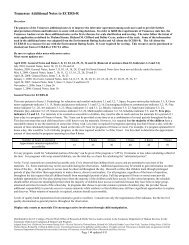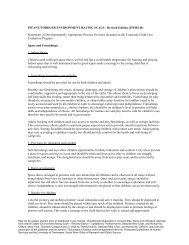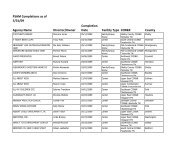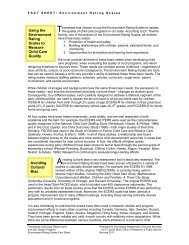ECERS-R - Star-Quality Program
ECERS-R - Star-Quality Program
ECERS-R - Star-Quality Program
You also want an ePaper? Increase the reach of your titles
YUMPU automatically turns print PDFs into web optimized ePapers that Google loves.
20. Art<br />
Children benefit from exposure to child-initiated art activities that are open-ended and process<br />
oriented. Children’s art should be respected and appreciated as individual, creative expression.<br />
Materials and opportunities to create art projects at a beginning and more advanced level should be<br />
available as children are developmentally ready for them.<br />
21. Music/movement<br />
Music and movement are valuable means of learning. Children need a supportive environment that<br />
includes a teacher and a variety of tools to encourage their self-expression through music and related<br />
activities.<br />
22. Blocks<br />
Block play, with a variety of blocks and accessories, allows children the opportunity to explore spatial,<br />
mathematical, and role-play possibilities. Powerful block play requires sufficient space in a protected<br />
area and time to expand on concepts and ideas.<br />
23. Sand/water<br />
Sand and water play gives children the opportunity to learn concepts through active exploration with<br />
their senses. The addition of interesting props extends the learning potential offered through sensory<br />
play.<br />
24. Dramatic play<br />
Dramatic play gives children the opportunity to discover an array of roles and responsibilities. It<br />
provides a vehicle through which they make sense of their world. Dramatic play is enhanced by<br />
space, time, props, materials, and supportive teachers.<br />
25. Nature/science<br />
Science and nature activities and materials foster curiosity and experimentation benefiting the young<br />
learner through direct experience and application to other areas of learning. Concept and observation<br />
skills are strengthened through science procedures.<br />
26. Math/number<br />
Math skills, when introduced through appropriate hands-on methods, form a foundation for school<br />
readiness and later academic success. Math skills can be taught effectively through routines,<br />
schedule, and play activities.<br />
27. Use of TV, video, and/or computer<br />
TV/video viewing and computer use tend to be passive in comparison to active involvement with<br />
materials and people. The use of each should be confined to subject material that is age-appropriate<br />
and mentally stimulating. Time limits encourage more active learning. Participation should not be<br />
required.<br />
28. Promoting acceptance of diversity<br />
Children need to be exposed to the similarities and differences of people in positive ways through<br />
books, pictures, toys, materials, and interaction. This exposure encourages respect for others and<br />
lessens misunderstandings.<br />
May not be copied, shared, sold, or distributed in any manner. Unauthorized duplication is not permitted.<br />
Items and indicators reprinted from Early Childhood Environment Rating Scale – Revised Edition – Updated<br />
by Thelma Harms, Richard M. Clifford, and Debby Cryer. (New York: Teachers College Press, 2005 by<br />
Thelma Harms, Richard M. Clifford, and Debby Cryer.) Used with the permission of the publisher and the<br />
authors. This project is funded under an agreement with the Tennessee Department of Human Services<br />
and the University of Tennessee, Social Work Office of Research and Public Service.




